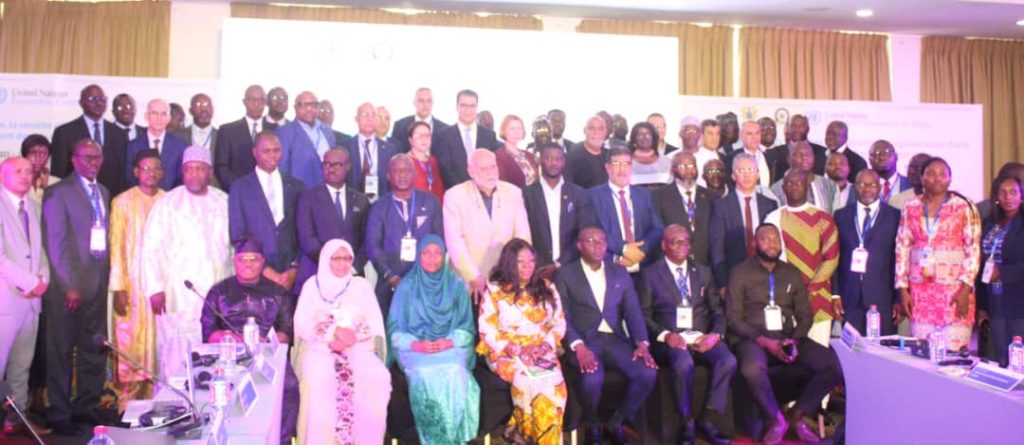By Morkporkpor Anku
Accra, Nov. 1 – The Second Joint Meeting of Intergovernmental Committees of Senior Officials and Experts for North and West Africa has opened with the call for investment in food security and energy transition on the African continent.
Madam Ngone Diop, Director of the Economic Commission for Africa (ECA) Office for West Africa said, “achieving food security and energy transition is instrumental to realising the SDGs in North and West Africa.”
The Director, speaking at the opening of the three-day meeting, said the move required the ambition to scale up high impact- investments, alliances with a wide range of regional, national, and global actors and a call for Action.
The UN Economic Commission for Africa (ECA) Sub-regional Offices for North and West Africa in partnership with the government are hosting the meeting from November 1 to November 3, 2023, in Accra.
The joint meetings provide opportunity for cross regional fertilisation, sharing of expertise, experiences, and innovative solutions to food and energy security challenges and of critical importance is of the meetings are a stepping stone to galvanise countries’ efforts to accelerate the SDGs, halfway to the deadline of achieving the global goals by 2030.

She said countries needed to act now to deliver the SDGs promise for equitable, inclusive sustainable development for All, leaving no one behind.
She said West Africa boasts of vast renewable energy potential that could be harnessed to cover unmet power demand and achieve universal access to electricity while transitioning to a low-carbon growth path.
Dr John Kumah, a Deputy Minister for Finance, said Ghana’s commitment to sustainable development and addressing climate change through the adoption of the National Energy Transition Framework was a shining example of the positive steps the country was taking toward a more sustainable future.
The Minister said as part of the updated Nationally Determined Contributions, Ghana was poised to have approximately 24 million tonnes of carbon credits available for transactions on the compliance market by 2030.
He said the country underscored the dedication to reducing carbon emissions and mitigating the impacts of climate change.
“We believe that green businesses and green jobs not only benefit our environment but also offer enhanced financial and social returns compared to traditional “business-as-usual” investments,” he added.
He said as a Continent “we must recognize that the challenges we face today require adaptable and forward-thinking approaches.”
He said ECA had been playing a pivotal role in establishing high-level platforms, such as the High-level Working Group on the Global Financial Architecture to elevate Africa’s voice and enhance coordination on critical issues.
He reiterated the commitment of Ghana to ensuring that due consideration was given to Africa’s voice, position, and common interest in global sustainable development issues.
“ECA is also fully committed to support its member States to a just, fair and equitable transition to renewable energy to ensure energy security and access to energy for all,” he added.
Madam Zuzana Brixiova Schwidrowski, Director of the ECA office for North Africa, said the AfCFTA “amid the cascading crises, the food and energy security in North and West Africa experienced major setbacks.”
She said between 2019 and 2022, almost 25 million additional people suffered from undernourishment in both regions combined.
She said the goal of the meeting was to propose recommendations that would facilitate just and sustainable food and energy transitions.
“This will require accelerated transition to renewables and reforms that promote investment and job rich growth in key sectors, especially energy and agriculture,” she added.
The United Nations anticipates global economic GDP to increase by 2.3% in 2023 and 2.5% in 2024, meaning they will remain below the average growth rate of the two decades prior leading up to the pandemic (3.1 per cent).
In Africa, growth rates are expected to experience a slight decrease, from 3.5% in 2022 to 3.4% in 2023, before returning to 3.5 per cent in 2024.
However, they are likely to remain well below the 7 per cent growth rate needed to achieve the Sustainable Development Goals by 2030.
In West Africa, for example, economic growth is estimated to have slowed to 3.9 per cent in 2022, down from 4.4 per cent in 2021. It is expected to further decrease to 3.8 per cent in 2023 before rebounding to 4.2 per cent in 2024.
Similarly, North Africa is experiencing relatively weak economic growth given its economic potential. While growth rates in North Africa declined from 5.4 per cent in 2021 to 3.1 per cent in 2022, projections suggest that growth rates will remain moderate in 2023 and 2024, ranging between 3.3 per cent and 3.4 per cent.
GNA
CA/
1 Nov. 2023
Caption: Pictures Attached